Slammed: The Seventies - Five things we learned from Wales documentary
- Published
Watch the trailer for Slammed: The Seventies
They were a trailblazing group of young players that would change rugby forever.
The Wales team of the 1970s have long been part of rugby folklore.
But what few people remember is just what it took to achieve sporting immortality.
With the help of never-seen-before footage and digitally-remastered scenes, a BBC documentary has charted the roots of that success.
Here are five things we learned from Slammed: The Seventies, which kicks off with the seeds of a rugby revolution.
The unthinkable
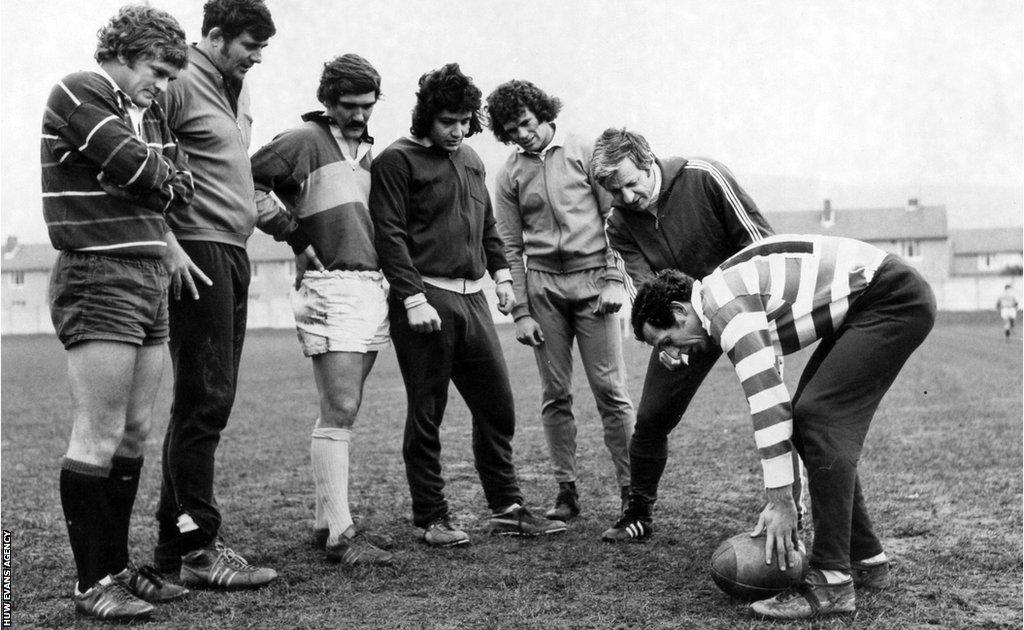
Ray Williams (second on right) introduced the concept of coaching into Welsh rugby - to much scepticism
There was a time - before player contracts, agents and image right - when rugby union was entirely amateur.
As part of that code, national teams were strictly forbidden from even meeting more than 48 hours before a Test match.
In the documentary we even witness a faintly ridiculous scene of the Wales team doing press-ups in the Twickenham car park before a match.
However there was a general suspicion the likes of New Zealand and South Africa were ignoring this rule so, in response, Wales took a radical step.
They appointed the world's first national coaching organiser Ray Williams who, in turn, convinced the Welsh Rugby Union to appoint its first national coach - former British Lions number eight David Nash.
Even the players were dubious.
"Many people were against it. They didn't even like the word coaching and in some cases, unions refused to use it," said Gerald Davies.
The gamble
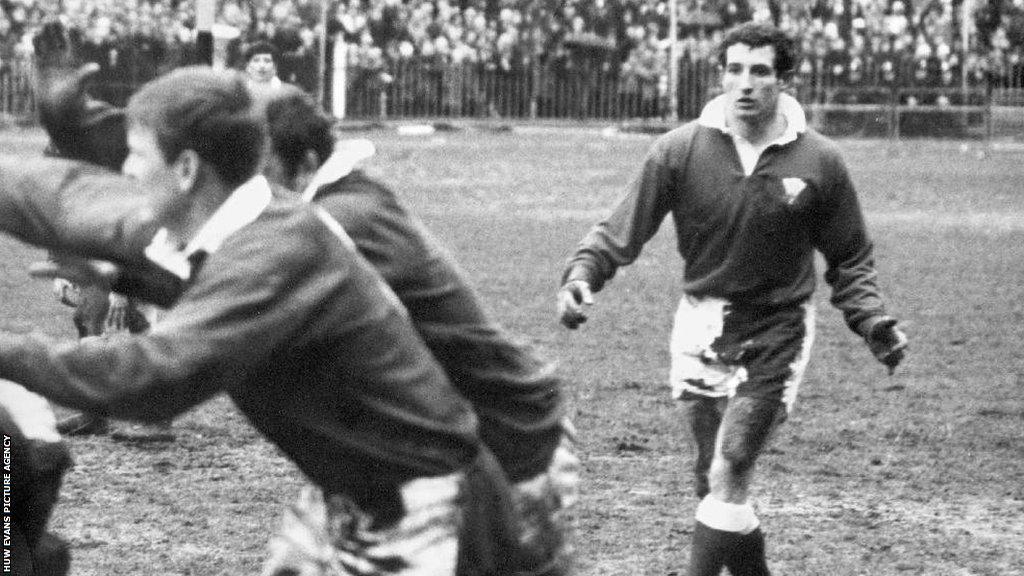
The selection of teenager Gareth Edwards was seen as a desperate "gamble" by Wales
After losing their opening two games of the 1967 Five Nations, Wales took a gamble on a promising but "erratic" 19-year-old scrum-half.
Gareth Edwards was still a trainee teacher and, as one newspaper reported, "not ready for the big time".
Nervous ahead of his international debut in Paris, the baby-faced Edwards asked his would-be half-back partner David Watkins for a practice session.
However the pair were turned away from the Arms Park by a fastidious groundsman who would not even lend the pair a ball.
"But I'm playing for Wales on Saturday!" pleaded Edwards.
"With that, Dai tied his jacket into a ball and we used that. So the first pass I ever threw Dai Watkins, my childhood hero, in preparation for my international debut was a rolled up coat from two yards away."
Wales lost 20-14... but years later Edwards would be voted the greatest player of all time
The inspiration
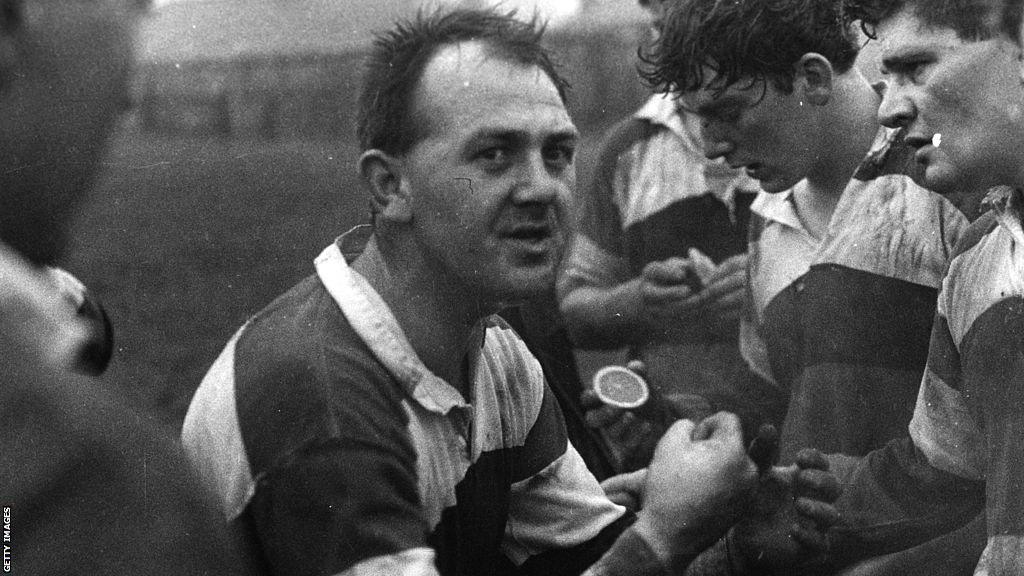
Clive Rowlands brought new training ideas - but above all else, passion
With many still scoffing at the idea of a national coach after a wooden spoon, Wales needed a lift and Clive Rowlands was just the man.
He had captained Wales to a Triple Crown three years earlier and the former teacher brought a new ethos towards training and preparation, including sessions on Aberavon beach.
Suddenly this young group of players got fitter, faster and had time to gel.
But it was Rowlands' unbridled passion that would inspire most of all.
"Clive wasn't a skills coach. The word he used most was 'calon' - everything was about heart," said former centre John Taylor.
"In the dressing room he would ask: 'What are we going to do?' And we would all shout back... WIN!"
In the next seven years under Rowlands, Wales won three championship titles, including a Grand Slam in 1971, and shared the title twice more.
The pressure
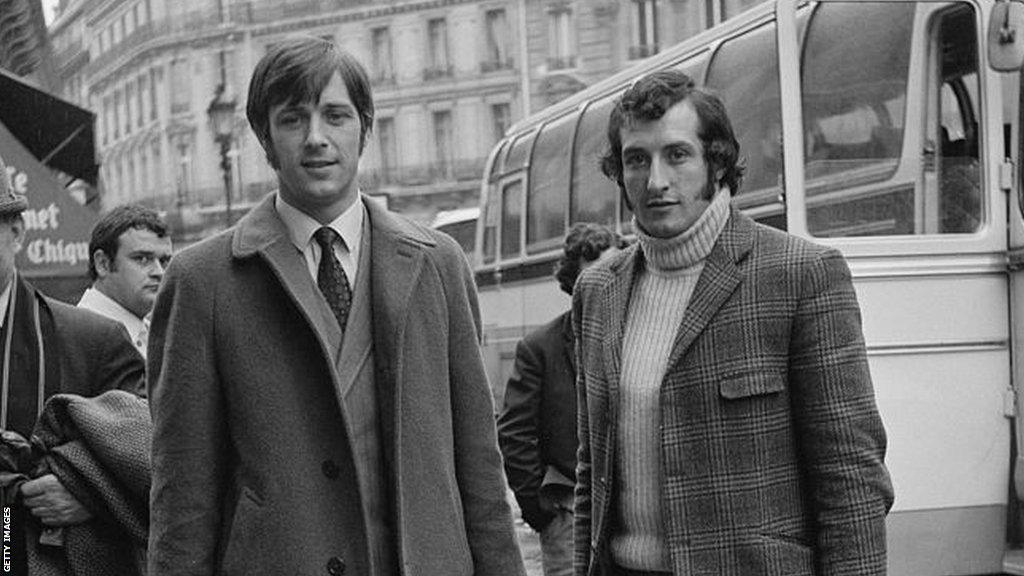
Barry John (L) and Gareth Edwards were idolised but were in the firing line if Wales ever lost
Believe it or not, there was a time when there were widespread calls for Barry John and Gareth Edwards to be dropped.
Humiliation in New Zealand followed by a heavy loss in Dublin in 1970 sparked a furious backlash from fans and pundits. Even their most famous players were not immune to stinging attacks.
"Do you think there wasn't pressure back then?" exclaimed Edwards.
"It was exciting but there was expectation. You're always expected to be at your very best. Don't let [people] down.
"In Wales, if you don't win, you're in trouble and we weren't beyond reproach."
Edwards was stripped of the captaincy.
The revenge
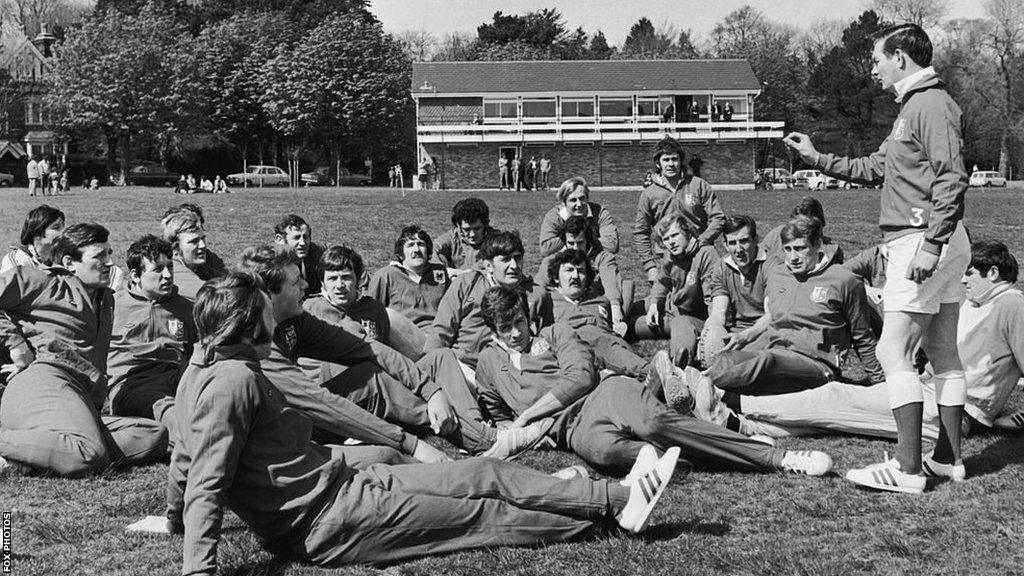
Wales' stars knew they had to win in New Zealand to be regarded the best
Wales roared back to form and swept aside all before them in the 1971 championship with John scoring the try that clinched a Grand Slam in Paris.
But there remained a thorn in their side. The memory of two hammerings at the hands of the All Blacks two years earlier still hurt.
"We had been put firmly in our place in '69 in New Zealand," said Taylor.
"There was expectation after [the slam] but we hadn't proved ourselves in the southern hemisphere. Without doing that, we were only top of the second division."
Some 13 Welshmen were selected for the British & Irish Lions tour to New Zealand that summer.
It would prove to be an era-defining series.
You can watch the first part of Slammed: The Seventies on BBC One Wales at 20:00 GMT on Wednesday or on demand on BBC iPlayer.

GAME CHANGERS: Go behind the scenes with Wales women's rugby team
RUCK STARS: Two of the biggest teams in rugby go head to head
